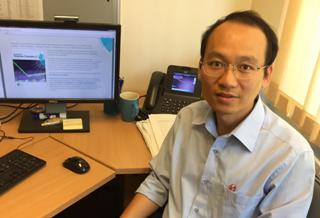Feb 10 2015
The use of silicon carbide as a semiconductor for mechanical and electrical sensor devices is showing promise for improved operations and safety in harsh working environments, according to new research from Griffith University.
 This is Dr. Dzung Dao, from Griffith University's School of Engineering. Credit:Michael Jacobson
This is Dr. Dzung Dao, from Griffith University's School of Engineering. Credit:Michael Jacobson
Experiments with silicon carbide grown at the Queensland Micro- and Nanotechnology Centre (QMNC) at Griffith University have demonstrated the compound's superiority as a semiconductor for high performance sensors.
The research has identified advantages for fields including mining, aerospace, aviation and the automotive, electrochemical and biomedical industries.
The findings appear in the specialist publication Journal of Materials Chemistry C and for the first time present the effect of mechanical strain on the electrical conductivity of silicon carbide deposited on silicon wafer.
"Over the past 50 years, silicon has been the dominant material used as a semiconductor for sensing devices and that continues today in computers, mobile phones, automobiles and more," says Dr Dzung Dao, from Griffith's School of Engineering and one of the lead researchers.
"However, silicon is not suitable for electronic devices at high temperatures above 200°C due to the generation of thermal carriers and junction leakage.
"Silicon carbide, on the other hand, possesses excellent mechanical strength, chemical inertness, thermal durability and electrical stability due to its unique electronic structure.
"Thus it holds promise as the material for high performance sensors in, for example, deep-oil and coal mining, combustion engines, energy conversion devices and so on.
"In areas where the temperature can reach well above 200°C, chemical corrosion and mechanical shock are extreme. That's where silicon carbide comes in.
"Silicon carbide is already used in power electronics and these results are very encouraging for sensor technology, particularly in harsh working environments."
The device-grade silicon carbide for this research was grown on six inches of silicon wafer at low temperature by Professor Sima Dimitrijev's team at QMNC.